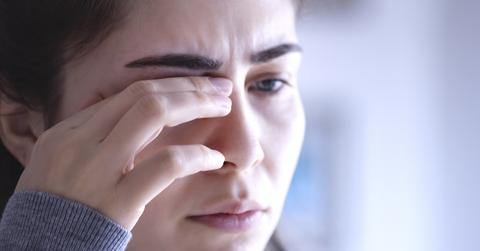Eye Twitching Could Be A Minor Annoyance or A Warning Sign — Here’s What to Know
Published Oct. 4 2023, 9:59 a.m. ET

The Gist:
Eye twitching is the involuntary muscular movement in the eyelid.
Eye twitching can be a symptom of stroke, but it is not very common.
Eye twitching is more likely to be the result of caffeine consumption, stress, and allergies.
Chances are you have experienced an eye twitch before. Eye twitching is when the muscles in the eyelid move involuntarily. Although an eye twitch is often a harmless and temporary condition, it can sometimes be a sign of a serious neurological problem.
A stroke is a sudden loss of oxygen in the brain that can cause neuromuscular twitches and paralysis, including eye twitching. But is eye twitching a sign of a stroke?

Is eye twitching a sign of a stroke?
Eye twitching could be a sign of a stroke, but it's very rare.
During a stroke, there is a blockage in blood flow to the brain. Blood contains oxygen, and when the brain does not have enough oxygen, it can lead to brain damage. If brain cells die in parts of the brain responsible for motor control, symptoms like eye twitching, paralysis, and muscle numbness can occur, per Vision Center.
According to the National Institute on Aging, other signs of a stroke include confusion and trouble speaking, loss of eyesight or double vision, loss of balance and dizziness, sudden headache, drowsiness, and nausea. A stroke can be very short, so even if symptoms pass quickly, you should take them seriously as a sign of a stroke.
If you or someone you know has severe symptoms, it is best to consult a medical professional immediately to receive the proper care.

What causes eye twitching?
Eyes can twitch due to many other things besides the rare stroke. According to All About Vision, if your eye(s) is twitching and you lack any other symptoms, it could result from caffeine, dry eyes, fatigue, stress, malnutrition, smoking, and allergies.
However, eye twitching can also be a sign of an underlying neuromuscular condition. These include Bell's palsy, Cervical dystonia, Multiple sclerosis (MS), Dystonia, Parkinson's Disease, Tourette syndrome, Benign essential blepharospasm, Hemifacial spasm, and Myasthenia gravis, per Healthline.

How is eye twitching treated?
After contacting your healthcare provider about your eye twitch, you will likely undergo a nervous system exam and an eye exam to reach a diagnosis. In more severe cases, an MRI or CT scan may be conducted to allow them to analyze your brain further.
If you are experiencing a mild case of eye twitching, your doctor may ask you about your sleep habits, caffeine intake, and nutrition to help suggest ways to reduce the twitch. In some cases, the doctor may suggest a botulinum toxin injection (Botox), to keep the muscles from moving, or a medicine.
Surgery is also an option. A myectomy is a procedure that removes muscles and nerves from the eyelids to stop the twitching, per UC San Diego Health.